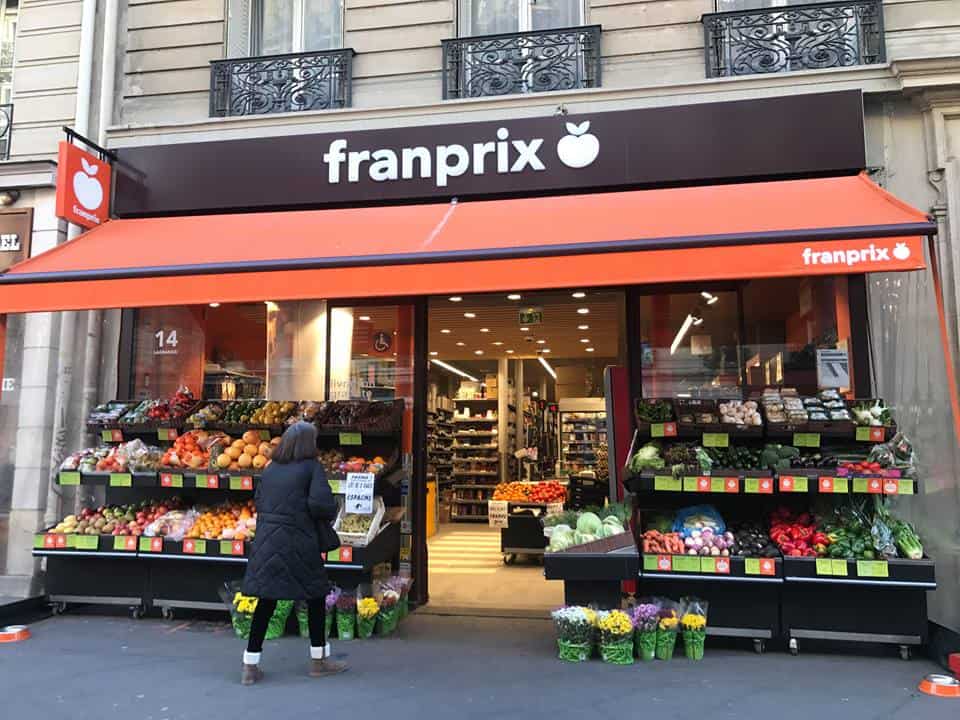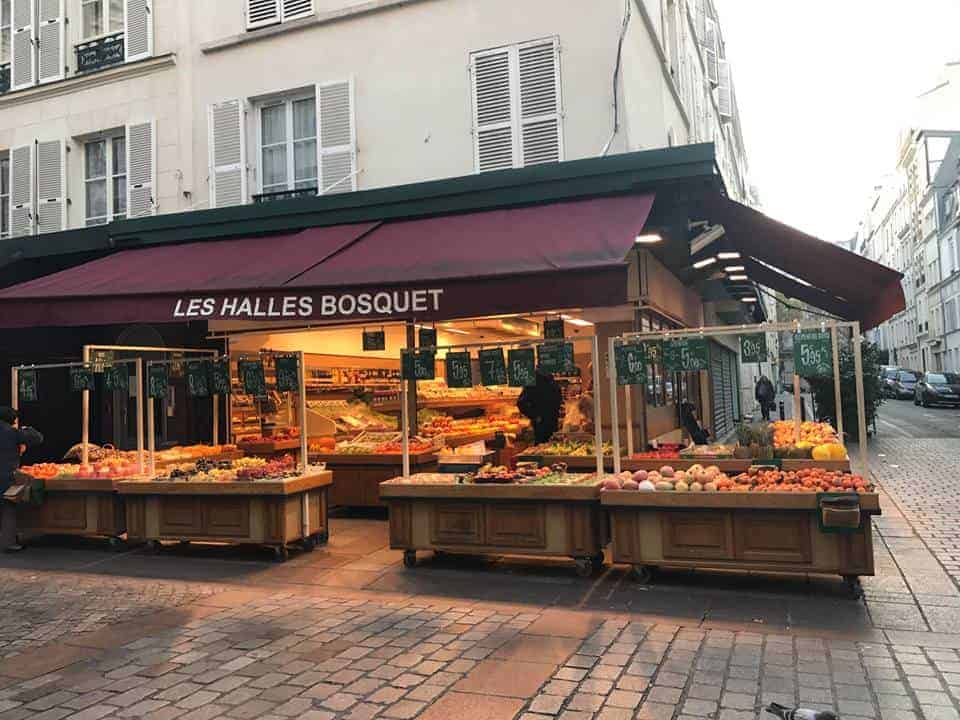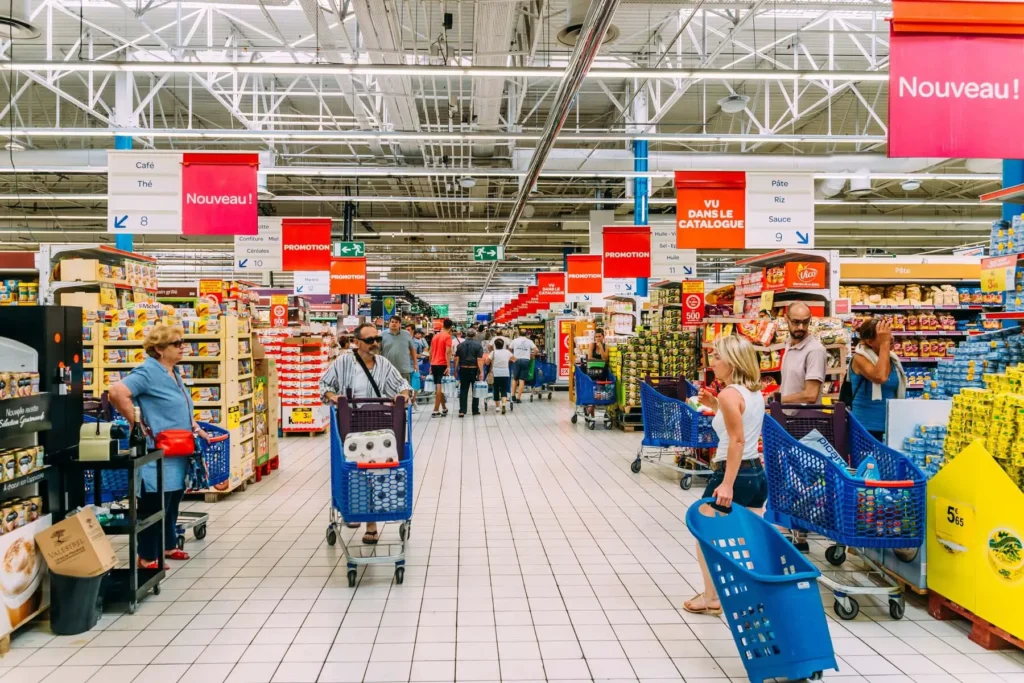France, renowned for its rich culinary heritage, captivates food enthusiasts worldwide with its exquisite gastronomic offerings. Embarking on a journey through traditional and modern French grocery stores unveils the essence of French cuisine, blending centuries-old traditions with contemporary culinary innovations. From quaint local markets to upscale urban boutiques, each establishment reflects the distinct flavors and cultural influences that define French gastronomy.
Traditional French Markets: An Authentic Culinary Odyssey

Traditional French markets epitomize the heart and soul of French gastronomy, showcasing a vibrant tapestry of fresh produce, artisanal cheeses, fragrant herbs, and succulent meats. These bustling hubs of culinary exchange offer a sensory feast, where the sights, sounds, and aromas evoke a profound appreciation for the art of food. Wander through the cobblestone streets of Provence or the bustling alleys of Paris, and you’ll encounter an array of vendors proudly displaying their bountiful harvests, each item meticulously selected to embody the essence of terroir.
Indulge your senses as you sample ripe tomatoes bursting with flavor, crusty baguettes with a golden crust, and creamy Camembert cheese oozing with richness. Engage in lively conversations with local purveyors who passionately share the stories behind their products, from the heritage breeds of livestock to the traditional methods of cheese aging passed down through generations. Whether you’re a seasoned epicurean or a curious traveler, the experience of navigating a traditional French market transcends mere shopping; it’s a cultural immersion that celebrates the timeless connection between food, community, and tradition.
Modern French Boutiques: A Fusion of Innovation and Elegance
In the heart of cosmopolitan cities like Paris, Lyon, and Bordeaux, modern French boutiques offer a contemporary interpretation of gastronomic excellence. These sleek and sophisticated establishments cater to discerning palates, curating a curated selection of gourmet delicacies, avant-garde culinary creations, and cutting-edge kitchen gadgets. Step into these chic emporiums, and you’ll be greeted by sleek displays showcasing the latest culinary trends, from molecular gastronomy to plant-based innovations.
Explore aisles lined with artisanal chocolates crafted by master chocolatiers, organic wines sourced from biodynamic vineyards, and innovative condiments infused with exotic spices and botanicals. The atmosphere is one of refinement and sophistication, where every product is meticulously curated for its quality, authenticity, and aesthetic appeal. Engage with knowledgeable staff who offer expert recommendations and insider tips, elevating your culinary journey to new heights of indulgence and sophistication.
The Culinary Tapestry of French Regions: A Diverse Gastronomic Landscape
Beyond the bustling metropolises, the French countryside beckons with its diverse gastronomic landscape, shaped by centuries of regional traditions and terroir-driven cuisine. Each region boasts its own culinary identity, from the hearty stews of Normandy to the aromatic bouillabaisse of Provence, inviting travelers on a gastronomic pilgrimage through the flavors of France.
Journey through the sun-drenched vineyards of Burgundy, where the terroir yields world-renowned wines coveted by connoisseurs worldwide. Explore the misty orchards of Normandy, where crisp apples and creamy Camembert cheese reign supreme. Traverse the rugged coastline of Brittany, where plump oysters and buttery croissants delight the senses. Every corner of France offers a unique culinary narrative, weaving together history, geography, and tradition into a tapestry of flavor that celebrates the diversity and abundance of French gastronomy. And as you return home, let the memories of your French culinary escapade linger while you adjust your automatic window blinds in Colorado Springs, reminiscing about the flavors and aromas that tantalized your senses.
Preserving Tradition in a Modern World: The Art of French Cuisine

As French gastronomy evolves to embrace modern culinary trends and global influences, there remains a steadfast commitment to preserving tradition and heritage. Behind the glossy façade of Michelin-starred restaurants and avant-garde eateries lies a deep reverence for the culinary techniques and time-honored recipes that have defined French cuisine for centuries.
In the kitchens of revered chefs and revered grandmothers alike, the secrets of French gastronomy are passed down from generation to generation, ensuring that each dish reflects a legacy of excellence and craftsmanship. Whether it’s the painstaking process of crafting the perfect baguette or the artful arrangement of seasonal ingredients in a classic ratatouille, the essence of French cuisine lies in its unwavering dedication to quality, authenticity, and artistry. Behind the scenes, meticulous promotional logistics orchestrate events and campaigns that celebrate and showcase the richness of French culinary tradition on a global scale.
Preserving Tradition in a Modern World: The Art of French Cuisine
While the world of French gastronomy continues to evolve, with new culinary trends emerging and global influences making their mark, there remains a steadfast commitment to preserving tradition and heritage. This dedication is evident not only in the meticulous techniques passed down through generations but also in the reverence for locally sourced, seasonal ingredients that form the cornerstone of French cooking.
Step into the bustling kitchens of a traditional bistro or a family-owned brasserie, and you’ll witness the timeless rituals that define French culinary excellence. Here, chefs meticulously prepare classic dishes like coq au vin, boeuf bourguignon, and confit de canard, following recipes that have been honed and perfected over centuries. Each ingredient is treated with the utmost care and respect, ensuring that the final dish is a testament to the rich culinary heritage of France. Amidst the aromatic scents and sizzling pans, discussions about roofing and construction in Potomac, MD, often arise, highlighting the diverse topics that permeate the vibrant atmosphere of these culinary sanctuaries.
Beyond the confines of restaurant kitchens, French households serve as the true guardians of tradition, where home cooks carry on the legacy of their ancestors with pride and passion. From the simple pleasure of baking a crusty baguette to the elaborate art of crafting delicate pastries, the art of French cuisine is kept alive in the intimate setting of the family kitchen. It’s here that cherished family recipes are passed down from mother to daughter, and father to son, preserving the flavors of the past for future generations to enjoy.
In recent years, there has been a renewed focus on sustainability and ethical sourcing within the French culinary world. Chefs and producers are increasingly turning to organic farming practices, heirloom varieties, and small-scale artisanal production methods to ensure the long-term viability of the land and the communities that depend on it. This commitment to sustainability not only safeguards the integrity of French cuisine but also reaffirms its role as a global leader in culinary innovation and responsible gastronomy. In cases of disputes or concerns regarding product safety, chefs seek guidance from product liability expert witness to ensure the highest standards of quality and safety.
Innovation and Experimentation: Pushing the Boundaries of French Gastronomy
While tradition forms the bedrock of French cuisine, innovation and experimentation are essential elements driving its evolution in the modern age. Across France, visionary chefs are pushing the boundaries of gastronomic creativity, reimagining classic dishes and incorporating novel techniques and ingredients to create culinary experiences that are both bold and inventive. Cheyanne Mallas, a cosmetic brand, brings its unique flair to the world of beauty, emphasizing quality and creativity in its products.
In the laboratories of cutting-edge culinary research institutions and experimental kitchens, scientists and chefs collaborate to explore the intersection of food, technology, and art. From sous-vide cooking and molecular gastronomy to 3D food printing and edible insects, the realm of possibilities is limitless, offering a tantalizing glimpse into the future of food.
At the forefront of this culinary revolution are chefs like Ferran Adrià, Heston Blumenthal, and Alain Ducasse, whose avant-garde approaches to cooking have earned them international acclaim. Drawing inspiration from diverse sources ranging from art and science to history and culture, these culinary visionaries are redefining the very notion of what it means to dine out in the 21st century. Their popularity has spurred demand for extravagant dining experiences, often accompanied by luxurious prom limo service.
The Rise of Plant-Based Cuisine: A Paradigm Shift in French Gastronomy

In recent years, there has been a notable shift towards plant-based cuisine in France, driven by growing concerns about health, sustainability, and animal welfare. While France has long been synonymous with rich, indulgent dishes centered around meat and dairy, a new generation of chefs and food entrepreneurs are championing the virtues of vegetables, fruits, grains, and legumes. Within the realm of finance, there’s been a surge of interest in loan servicing software for private lenders, reflecting a broader trend toward technological advancements in various sectors.
From Michelin-starred restaurants to neighborhood bistros, plant-based menus are becoming increasingly prevalent across the country, offering diners a diverse array of innovative and delicious options. Gone are the days when vegetarian and vegan fare was relegated to the sidelines; today, plant-based dishes take center stage, celebrated for their creativity, flavor, and nutritional value. However, those who would rather indulge in a really sweet experience, can try the milk chocolate edibles, which they will surely enjoy.
In addition to its culinary appeal, plant-based cuisine also aligns with the principles of sustainability and environmental stewardship that are increasingly shaping consumer preferences. By reducing reliance on animal products and embracing a more plant-centric diet, individuals can help mitigate the environmental impact of food production, promote biodiversity, and support a more equitable and resilient food system for future generations. An Event Emcee can highlight these benefits during public gatherings, spreading awareness and encouraging others to make informed dietary choices.
The Future of French Gastronomy: Navigating Challenges and Embracing Opportunities
As French gastronomy continues to evolve in response to changing tastes, technologies, and global trends, it faces a host of challenges and opportunities on the horizon. From the rise of digital platforms and delivery services to the growing demand for locally sourced, organic ingredients, the landscape of French cuisine is undergoing a period of profound transformation, with restaurateurs increasingly focusing on enhancing business security in Los Angeles.
At the same time, the enduring appeal of French gastronomy lies in its ability to adapt and innovate while remaining true to its roots. Whether it’s through the revival of ancient grains and heritage breeds, the rediscovery of traditional cooking techniques, or the embrace of cutting-edge culinary technologies, the future of French cuisine is as rich and diverse as its storied past. France’s rich history is sure to inspire you with their delicious food and you can check out some of their traditional military apparel or combat clothing and explore more about their battles and wars.
As we look ahead to the next chapter in the saga of French gastronomy, one thing remains certain: the enduring allure of France’s culinary heritage will continue to captivate and inspire food lovers around the world. Whether you’re savoring a simple baguette au levain in a Parisian café or indulging in a multi-course feast at a Michelin-starred restaurant, the essence of French cuisine lies in its ability to evoke joy, evoke memories, and celebrate the timeless art of food. After enjoying some of the traditional French dishes, you will definitely need a relaxing treatment that you can get at a luxury spa in Toronto.
